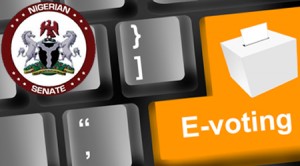 The Senate at its plenary on Thursday, 3rd July 2014 passed the Electoral Act (Amendment Bill) 2014 in a manner that was consistent with the recommendations of its Committees on the Review of the 1999 Constitution and the Independent National Electoral Commission (INEC).
The Senate at its plenary on Thursday, 3rd July 2014 passed the Electoral Act (Amendment Bill) 2014 in a manner that was consistent with the recommendations of its Committees on the Review of the 1999 Constitution and the Independent National Electoral Commission (INEC).
Presenting the report of the two Committees at the Plenary, the Senate leader Victor Ndoma-Egba stressed that the amendments to the Electoral Act were necessary to improve the management of the electoral system and legal framework for the electoral process in a manner that would enable INEC to handle its responsibilities effectively. A clause-by-clause consideration of the proposals was considered after the presentation of the Report.
Some of the proposed amendments to the Electoral Act, 2010, which were passed, includethe alterations to sections 8, 18, 52(2) and 123. The alteration to section 8 provides for a four-year tenure for the Secretary of the Commission, which is not currently contained in the 2010 Electoral Act. Section 18 increases the time frame in which INEC can issue a duplicate voter’s card from 30 days to 60 days when the original card has been lost, defaced or damaged. Also, the proposed Section 52(2) enables INEC to determine the voting procedure for elections in Nigeria. This amendment is a marked departure from the present Electoral Act that explicitly bars Electronic voting. It will be within the purview of INEC to determine if electronic voting should be used. In addition, section 123 was amended to ensure that polling officers, political party or agents who conspire to make a false declaration of result face a N500, 000 fine or twelve months imprisonment.
The Lawmakers however, rejected a number of the proposals including the proposal to amend Section 100(a) of the Electoral Act to provide for a compulsory Presidential debate for all candidates contesting the office of President; the alteration to section 25 to empower INEC to conduct all elections in one day, the alteration to section 87, which would empower INEC to exclude the nominated candidate of a party when it breached the provisions of the Constitution or the Electoral Act; and Senate Bill 297 that sought to vest the responsibility of proving the regularity of an election on INEC was rejected in its entirety.
It is noteworthy that the passage of the Electoral (Amendment) Bill 2014 conforms with the ECOWAS Protocol on Good Governance to which Nigeria is signatory to, stipulates that Electoral Amendments should be passed at least six months before the General Elections.
